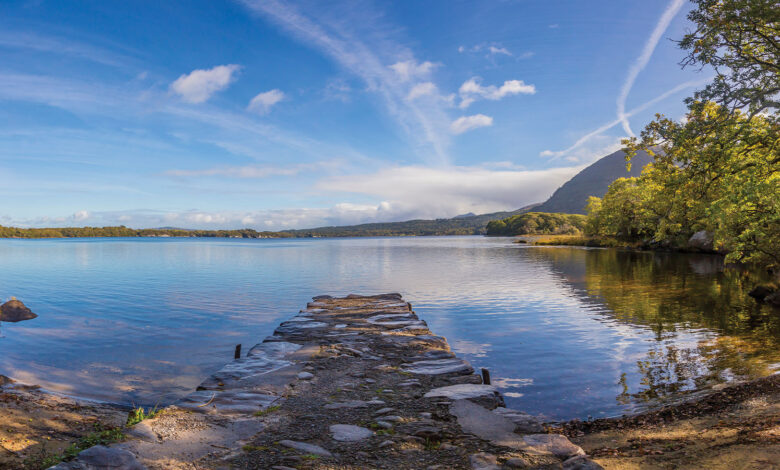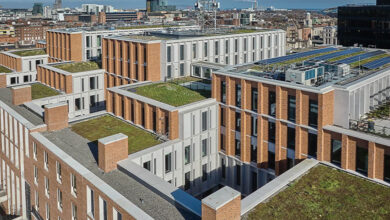Policy framework sets tourism direction to 2030

Before the dissolution of the previous Dáil, the then-Department of Tourism, Culture, Arts, Gaeltacht and Media published the Tourism Policy Framework 2025-2030, setting out a range of sustainability-related goals for the sector.
Published in November 2024, the framework identifies climate action, environmental protection, and social responsibility as core components of future tourism development in Ireland. It takes a three-pillar approach – environmental, economic, and social – with particular emphasis placed on environmental sustainability due to intersecting national and EU targets.
Environment
Under the environmental pillar, the framework specifies that the State’s tourism sector must play a role in achieving climate mitigation objectives. A key action involves calculating a baseline for tourism-related carbon emissions, for which Fáilte Ireland is responsible. Once the baseline is determined, the Department of Enterprise, Tourism and Employment will be mandated to establish reduction targets. By 2030, the average carbon emissions per visitor bed night must be reduced by 60 per cent. Targets will be embedded in successive short-term tourism action plans.
Tourism businesses will be expected to undertake environmental audits and implement emissions reduction measures. Public supports, such as grants or promotional funding, may be linked to evidence of environmental action. Guidance will be developed for operators to adopt practices such as switching to low-emissions energy sources, improving insulation, and reducing food waste. A platform will be launched to allow businesses to share examples of actions taken, with a focus on replicable and measurable outcomes.
The framework also requires the publication of a sectoral adaptation plan under the National Adaptation Framework. This aims to address risks to tourism infrastructure from sea level rise, increased storm activity, flooding, and other climate-related impacts. The aim is that the plan will identify vulnerabilities in tourism-heavy regions and provide guidance on long-term resilience strategies.
Biodiversity is another area covered under the environmental pillar. The policy outlines that tourism development should not compromise natural habitats and must align with the National Biodiversity Action Plan. Businesses will be encouraged to enhance biodiversity at their sites using measures such as wildflower planting, reduction of pesticide use, and conservation of native species habitats. Local authorities and public agencies will be asked to consider biodiversity impacts when planning tourism-related infrastructure.
Water quality and waste are also addressed. The policy notes that tourism generates waste and resource consumption, particularly in high-traffic areas. The document refers to the national Waste Action Plan for a Circular Economy and sets out expectations for increased recycling, food waste prevention, and reduced plastic use in the tourism sector. Accommodation providers and visitor attractions are to ensure proper waste segregation, and the use of reusable items such as cups and containers will be promoted.
Transport is identified as a major source of emissions linked to tourism. The policy includes actions to reduce transport-related emissions, both for travel to and within Ireland. Visitors are to be encouraged to use ferries, rail and sail options, and low-emission vehicles.
To achieve this, the framework envisages collaboration with agencies responsible for transport infrastructure to support the rollout of electric vehicle (EV) charging stations at key tourism sites. Public and active transport options, such as cycling and walking, are to be included in destination experience development plans (DEDPs), especially in rural and nature-based tourism regions.
Economic and social
The economic and social pillars of the framework also contain elements linked to sustainability. Economic goals include a shift away from visitor volume growth towards revenue per visitor, based on the rationale that fewer, longer stays have a lower carbon impact than high turnover. Domestic tourism is identified as a lower-emissions alternative to outbound travel, and policies will be developed to encourage Irish residents to holiday at home.
Socially, the framework states that tourism should benefit host communities and avoid negative local impacts. It outlines that local authorities and tourism agencies should consider seasonality, regional balance, and employment quality when developing tourism strategies. The development of tourism careers that are stable, full-time, and year-round is a stated objective. Training will be made available to support businesses and communities in delivering sustainable tourism services.
The policy also states that tourists should be made aware of sustainability efforts and their role in contributing to them. The framework states that awareness campaigns will be launched to promote water conservation, litter prevention, recycling, and low-impact travel. The tourism agencies are expected to incorporate sustainability messaging into marketing materials, itineraries, and visitor information resources.
Verification and measurement are addressed through commitments to improve data collection and introduce reporting on environmental indicators. This includes revisions to visitor satisfaction surveys to capture perceptions of Ireland as a sustainable destination. Certification schemes and ecolabels may be supported or recognised, and Ireland’s performance will be aligned with international benchmarks where feasible.
Speaking at the time of publication, then-Minister Catherine Martin said: “This policy is formulated using the well-established sustainable development model that balances economic development with environmental and social considerations. Implementing the strategic objectives of this policy framework will bring tangible benefits to the sector and will also provide facilities and experiences of value to local communities.”





